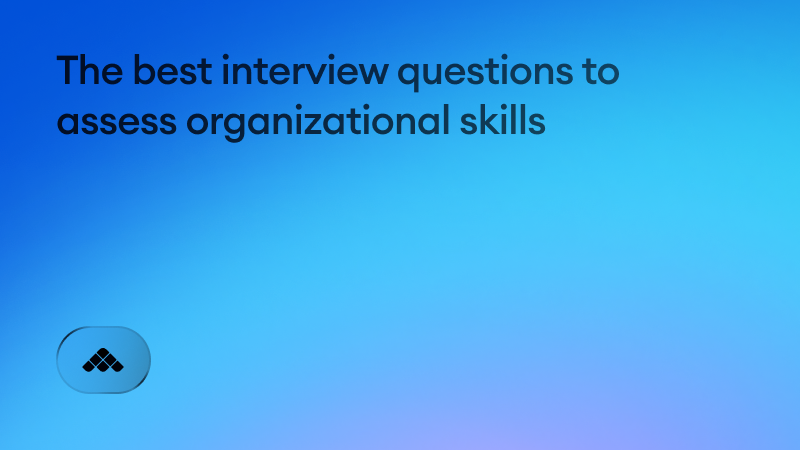Organizational skills are paramount to ensuring efficiency, meeting deadlines, and achieving both individual and team goals. Assessing a candidate's ability to organize tasks, manage time, and maintain structure is crucial during the hiring process.
Effective organizational skills contribute to smoother workflows, reduced stress, and higher productivity, making them a critical competency for many roles across various industries.
Here's your guide to assessing organizational skills, including the best interview questions to ask.
What are organizational skills?
Organizational skills are the abilities that help someone manage their time, tasks, information, and priorities in a structured, reliable way. They allow a person to stay focused, reduce friction, and keep work moving even when juggling multiple responsibilities.
Strong organizational skills lead to better productivity, smoother collaboration, and fewer dropped balls—qualities that matter even more in remote or distributed environments.
Why are organizational skills in hot demand?
Organized employees keep teams moving smoothly because they plan ahead, manage their workload intelligently, and prevent small problems from turning into big ones. When people are structured and reliable, projects move faster, collaboration becomes easier, and leaders spend far less time chasing updates or fixing avoidable mistakes.
Strong organizational skills also reduce the cognitive load on teams—clear documentation, clean processes, and predictable execution free everyone up to do higher-impact work.
In remote environments especially, organized workers become force multipliers: they maintain clarity, keep communication tight, and ensure nothing slips through the cracks.
Interview questions about organizational skills
Here are the best questions to test candidates' organizational skills in the interview process.
- Can you describe a time when you had to manage multiple projects simultaneously? How did you prioritize your tasks?
- How do you organize your workspace to maximize productivity?
- What tools or systems do you use to keep track of your tasks and deadlines?
- Can you provide an example of how you planned and executed a long-term project?
- How do you handle unexpected changes or interruptions in your schedule?
- Describe a situation where you had to coordinate with team members to achieve a common goal. How did you ensure everything stayed on track?
- What strategies do you use to stay organized when handling complex information or data?
- How do you set and achieve your personal and professional goals?
- Can you give an example of a time when your organizational skills helped you overcome a significant challenge at work?
- How do you balance attention to detail with the need to complete tasks efficiently?
What to look for in answers
- Prioritization skills: Look for candidates who demonstrate the ability to assess tasks based on urgency and importance, effectively managing their time and resources.
- Use of organization tools: Candidates should mention specific tools or systems (e.g., digital calendars, project management software) that aid in maintaining organization and tracking progress.
- Proactive planning: Strong answers will include examples of thorough planning and foresight in executing projects or managing tasks.
- Adaptability: Assess how candidates handle unexpected changes, interruptions, or challenges while maintaining their organizational structure.
- Collaboration and coordination: Look for evidence of organizing and collaborating with others to achieve shared objectives efficiently.
- Detail orientation and efficiency balance: Candidates should show the ability to maintain attention to detail without compromising on the efficiency and timely completion of tasks.
- Problem solving through organization: Responses should highlight how organizational skills have been pivotal in overcoming workplace challenges.
- Goal setting and achievement: Look for clear examples of setting realistic goals and the structured approach taken to achieve them.
Tips to evaluate organizational skills
On top of asking the right questions, here are the tactics to ensure you've fully considered a candidate's organizational skills.
- Request specific examples: Encourage candidates to provide detailed instances from their past experiences where their organizational skills were instrumental in achieving positive outcomes.
- Assess their use of tools and techniques: Inquire about the specific tools, software, or methodologies they employ to stay organized, indicating their familiarity with industry-standard practices.
- Observe their communication style: Pay attention to how candidates articulate their processes and strategies, as clear communication often reflects good organizational habits.
- Incorporate practical assessments: Consider including tasks or scenarios during the interview that require candidates to demonstrate their organizational abilities in real-time.
- Check for consistency and reliability: Evaluate whether the candidate’s past experiences consistently showcase strong organizational skills, indicating reliability and efficiency.
- Discuss time management strategies: Explore their approaches to managing time, meeting deadlines, and handling multiple responsibilities to gauge their proficiency in maintaining order.
- Evaluate their ability to adapt: Determine how well candidates can adjust their organizational strategies in response to changes or unexpected challenges in the workplace.
Summary
Assessing organizational skills during the interview process is essential for identifying candidates who can effectively manage their workload, prioritize tasks, and contribute to a structured and productive work environment.
By asking targeted questions and carefully evaluating the responses, interviewers can gain valuable insights into a candidate's ability to stay organized, adapt to changes, and collaborate efficiently.
Implementing these strategies ensures that new hires possess the critical organizational competencies necessary for success and growth within the organization.


